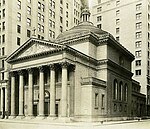Metropolitan Life Insurance Company Tower

The Metropolitan Life Insurance Company Tower (colloquially known as the Met Life Tower and also as the South Building), is a skyscraper occupying a full block in the Flatiron District of Manhattan in New York City. The building is composed of two sections: a 700-foot-tall (210 m) tower at the northwest corner of the block, at Madison Avenue and 24th Street, and a shorter east wing occupying the remainder of the block bounded by Madison Avenue, Park Avenue South, 23rd Street, and 24th Street. The South Building, along with the North Building directly across 24th Street, comprises the Metropolitan Home Office Complex, which originally served as the headquarters of the Metropolitan Life Insurance Company (now publicly known as MetLife). The South Building's tower was designed by the architectural firm of Napoleon LeBrun & Sons and erected between 1905 and 1909. Inspired by St Mark's Campanile, the tower features four clock faces, four bells, and lighted beacons at its top, and was the tallest building in the world until 1913. The tower originally included Metropolitan Life's offices, and since 2015, it has contained a 273-room luxury hotel known as the New York Edition Hotel. The tower was designated as a city landmark by the New York City Landmarks Preservation Commission in 1989, and was listed on the National Register of Historic Places in 1972. It was also made a National Historic Landmark in 1978. The east wing was designed by Lloyd Morgan and Eugene Meroni and constructed in two stages between 1953 and 1960. The east wing is also referred to as One Madison Avenue. It replaced another building on the site, which was built in phases from 1893 to 1905, and which was also designed by LeBrun's firm. When the current east wing was built, the 700-foot tower was extensively renovated as well. In 2020, work started on an addition to the east wing, which will be designed by Kohn Pedersen Fox and be completed in 2023 or 2024.
Excerpt from the Wikipedia article Metropolitan Life Insurance Company Tower (License: CC BY-SA 3.0, Authors, Images).Metropolitan Life Insurance Company Tower
Madison Avenue, New York Manhattan
Geographical coordinates (GPS) Address External links Nearby Places Show on map
Geographical coordinates (GPS)
| Latitude | Longitude |
|---|---|
| N 40.741111111111 ° | E -73.9875 ° |
Address
Metropolitan Life Insurance Company Tower
Madison Avenue 1
10010 New York, Manhattan
New York, United States
Open on Google Maps









